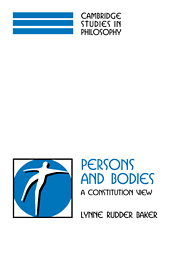Book contents
9 - In Favor of the Constitution View
Published online by Cambridge University Press: 05 June 2012
Summary
Throughout, I have been giving reasons to accept the Constitution View of human persons. In this final chapter, I want to assemble those reasons, expand on some of them, and add others. The aim of this chapter is to emphasize the strengths of the Constitution View and to argue for its superiority to the rival views of persons and bodies.
YES, MATERIALISM
One of the virtues of the Constitution View that I have touted is that it is a form of materialism: The Constitution View shows what is special about human persons without supposing that they are anything but material beings. But does it, really?
Mind/body dualists sometimes weigh in with the charge that the Constitution View is not really a materialist view, but rather leads to immaterialism. They argue as follows:
(1)If I am a material object, then there is some material object to which I am identical.
(2)If I am identical to any material object, then I am identical to my body or some part of it.
(3)It is possible that I exist when neither my body nor any of its parts exist.
Therefore,
(4)I am not identical to my body or any part of it.
Therefore,
(5)I am not identical to any material object (by (4) and (2)).
Therefore,
(6)I am an immaterial object.
Of course, we should resist drawing this conclusion, for premise (2) should be rejected outright.
- Type
- Chapter
- Information
- Persons and BodiesA Constitution View, pp. 213 - 230Publisher: Cambridge University PressPrint publication year: 2000



